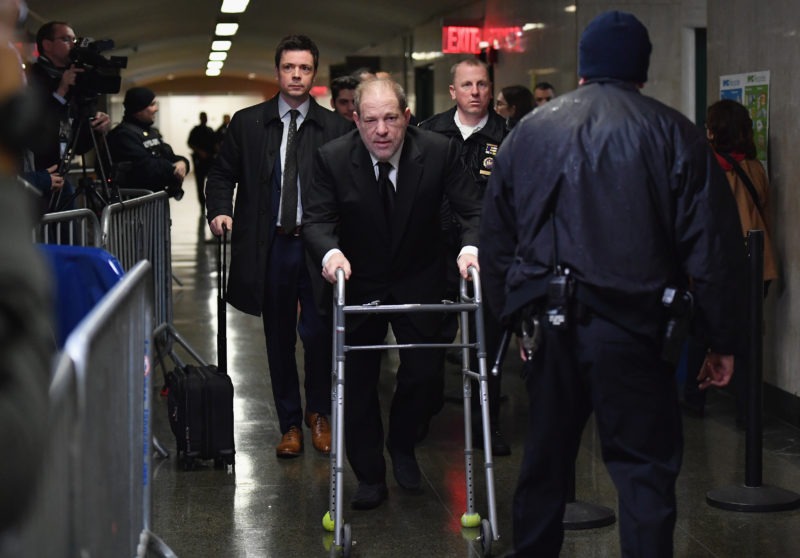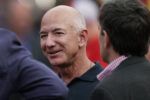Jury consultants will play key role in Weinstein trial
Jury selection is key in the trial of Harvey Weinstein, seen here entering Manhattan Criminal Court on January 16 in New York (Angela Weiss)
New York (AFP) – During the jury selection process, particularly in high-profile trials such as Harvey Weinstein’s, consultants who decode every potential juror’s answers and decipher the slightest of reactions play a key role in the case’s outcome.
The experts, often psychologists or criminologists, won’t speak during hearings or be mentioned in court reports but their work will help determine whether a defendant is convicted or acquitted.
They were first used in the 1970s but have become increasingly popular since O.J. Simpson’s trial and are present in almost every high-stakes criminal and civil trial in the United States. The consultants are used by the prosecution and defense.
“The jury selection process is the most critical point of the trial, because those individuals that you select are the ones that are going to make or break the case,” said Marshall Hennington of Hennington & Associates, a Los Angeles-based jury consulting firm.
The consultants “add a dimension that the attorneys have not thought about,” Hennington added.
New York prosecutors and Weinstein’s defense team took almost two weeks putting together a jury of 12 for the disgraced movie mogul’s rape and sexual assault trial. Six alternates are also being chosen.
It is an exhaustive process: During a first round of pre-screening, they quizzed some 700 candidates.
Many were immediately excused because they said they could not be fair and impartial in the proceedings key to the #MeToo movement, which have garnered intense media coverage.
Those who said they could keep an open mind were asked to fill out a questionnaire and return to court for further questioning.
– Screening –
The consultants, who are also often criminologists, help draft the questionnaires and then analyze the responses of the potential jurors to find any evidence of bias.
In Weinstein’s trial, biographical questions ranged from marital status, to employment and education level, to hobbies and membership in various organizations.
Candidates were also asked whether they or any family member had ever been the victim of sexual abuse and if they had ever worked in the entertainment industry.
Jo-Ellan Dimitrius, who worked for the defense in Simpson’s double murder trial and was credited with helping secure his 1995 acquittal, explained that potential jurors are screened even before they appear in court.
Consultants scour their social media accounts for a clue as to how they think.
“About 90 percent of our knowledge base going into a jury selection happens before we even see these folks,” she told AFP.
The remaining ten percent is acquired based on answers to the questionnaire and how the candidates conduct themselves in the courtroom.
“We want to see if their body language and how they interact with the attorneys may change our evaluation of a prospective juror, and sometimes it can change it drastically,” said Dimitrius.
Experts say it is becoming more difficult to identify biased jurors because there is a tendency to give socially acceptable or politically correct answers.
Hennington said candidates sometimes “purposely leave an answer blank” or provide “half an answer to an open-ended question.”
– Fair? –
Attorneys have two options if they want to dismiss from jury duty someone they believe is biased against their case.
They can issue a “strike for cause,” which is when they prove to the judge that the potential juror is biased. The defense and the prosecution can invoke this as many times as they like.
The other option is known as a “peremptory challenge.” No reason is required but prosecutors and defense attorneys may only use this 20 times each.
Weinstein lead prosecutor Joan Illuzzi-Orbon criticized Weinstein’s defense on Thursday for systematically striking out young women who may sympathize with the #MeToo movement.
Mary Noffsinger, a senior litigation consultant with Courtroom Sciences, Inc., said attorneys are increasingly looking to identify one or two “leaders” in the jury who will be favorable and influence other jurors.
“It seems to be that today people are more concerned about being part of the group as opposed to standing alone and doing what they think is right,” she said.
Consultants also help prep witness testimony, cross-examinations and oral arguments and regularly charge up to $10,000 a day during jury selection.
“I’m the puppeteer. I’ll make everybody shine,” said Hennington.
But can wealthy defendants evade justice by hiring pricey consultants?
“If consultants are working on both sides and are worth their while then the jury that is ultimately selected can be as fair as humanly possible,” said Dimitrius.
Disclaimer: Validity of the above story is for 7 Days from original date of publishing. Source: AFP.


